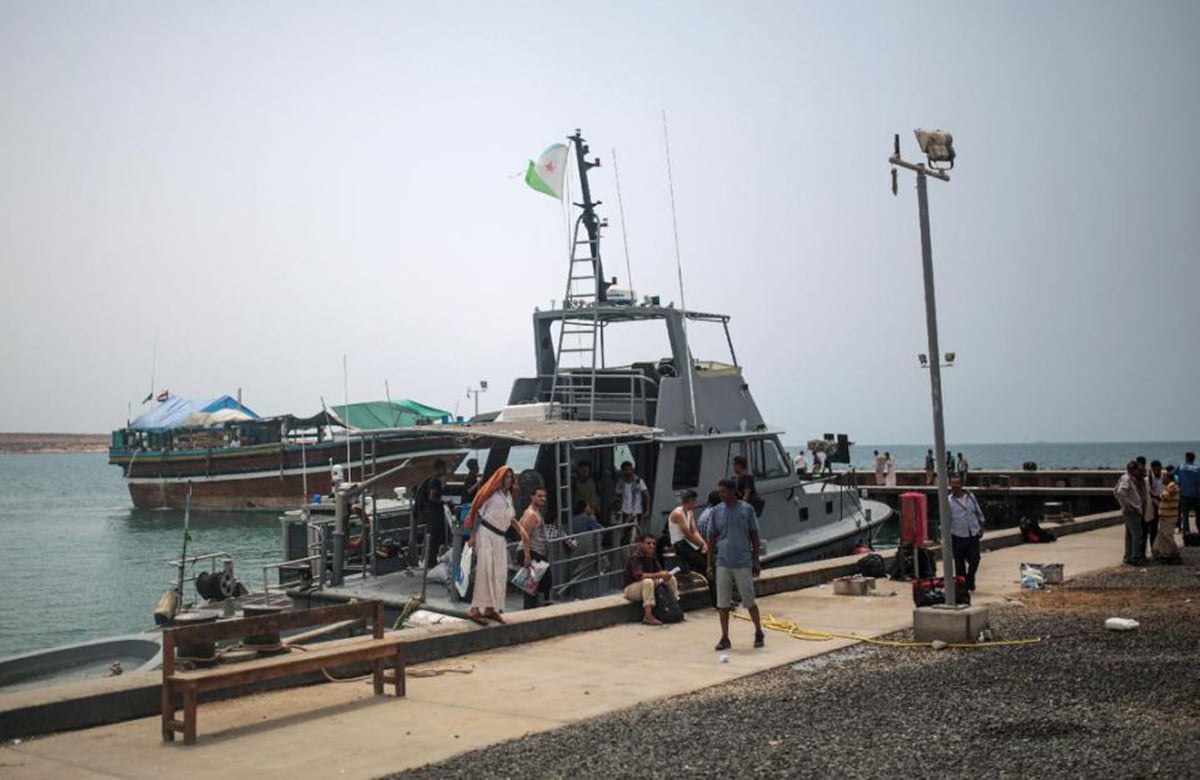OBOCK: Fleeing the war at home, thousands of Yemenis have made it across the Gulf of Aden to find refuge in Djibouti, a sleepy Horn of Africa nation where the United Nations has set up a staging hub for aid for the conflict-torn Arab country.
Many of the refugees are relieved to have escaped after two months of Saudi-led airstrikes targeting Yemen's Houthi rebels and fighting on the ground between rival factions that have pushed their country to the brink of collapse.
They arrived with just the few belongings they could carry, mostly on small, rickety fishing boats. Others came on bigger vessels crammed with people, reversing a perilous, centuries-old route which countless African migrants have taken in the other direction.
 |
| Newly-arrived Yemeni refugees wait at the Obock port in northern Djibouti —AP |
The United Nations High Commissioner for Refugees (UNHCR) says a total of 5,000 Yemeni refugees have made it to Djibouti, including 3,000 in the capital, Djibouti city, and 1,000 in Obock, 300 kilometres to the north — making it currently the biggest Yemeni refugee population.
The influx has hiked up local prices, with markets, hotels, and drivers trying to make the most of the situation in an already struggling economy. "We are overwhelming this country, but we have nowhere else to go," said Amin Nasser, a 45-year-old teacher from the Yemeni capital, Sanaa.
 |
| Yemeni refugee children play outside their rooms at an orphanage that has been turned into a centre for Yemeni refugees, in Obock, northern Djibouti. — AP |
Said Abu-Saleh, a 28-year-old from the Yemeni city of Taiz, had just arrived with 150 other people by boat. In the stifling heat, he was waiting to be processed by immigration police in the port of Djibouti.
"We came on a cattle boat, sitting next to the animals for 19 hours straight," he said.
In Obock, the Al-Rahma orphanage has become home to about 100 families, mostly from the Yemeni town of Bab Al-Mandab — just a 30-minute boat trip from Obock. Hamda, 55, takes care of her father, Ibrahim Mohamed, who, at 80, is the oldest refugee at the orphanage and who is both blind and deaf.
 |
| Ibrahim Mohamed, 80, and the oldest refugee at the centre, who is both blind and deaf, adjusts his hat, at an orphanage that has been turned into a center for Yemeni refugees, in Obock, northern Djibouti. — AP |
The two share their room with three other families. There are no doors or windows on the tiny buildings and the Yemenis have put up curtains between the rooms for privacy.
They spend the day mostly hanging out around the well in the yard but they say it's still better than the UNHCR-run Markaze camp — some 300 tents in the open desert.
Those in the camp have been provided with mosquito nets and blankets, and they get a daily ration of food and water, but there is no wall around the camp like there is around Al-Rahma and they have seen hyenas and snakes. If they need other supplies, the Yemenis say they walk the five kilometres to the city.
 |
| Pigeons fly over the Markaze refugee camp where Yemeni refugees are stationed in Obock, Djibouti. —AP |
Another Yemeni refugee, Om Sabreen, who is 29 and pregnant, lives at Markaze with her two daughters, hoping to be reunited with her husband who works in Saudi Arabia.
Marie-Claire Sowinetz, with the UNHCR in Djibouti, says the refugee agency is doing everything possible to provide the Yemenis with shelter, food, water and medical assistance in a very challenging environment.
"To be able to address all the needs of the vulnerable, we would need more and robust support from the international community," she said.
 |
| Newly-arrived Yemeni refugees wait at the Djibouti port in Djibouti city, where they are processed by immigration police. —AP |















































